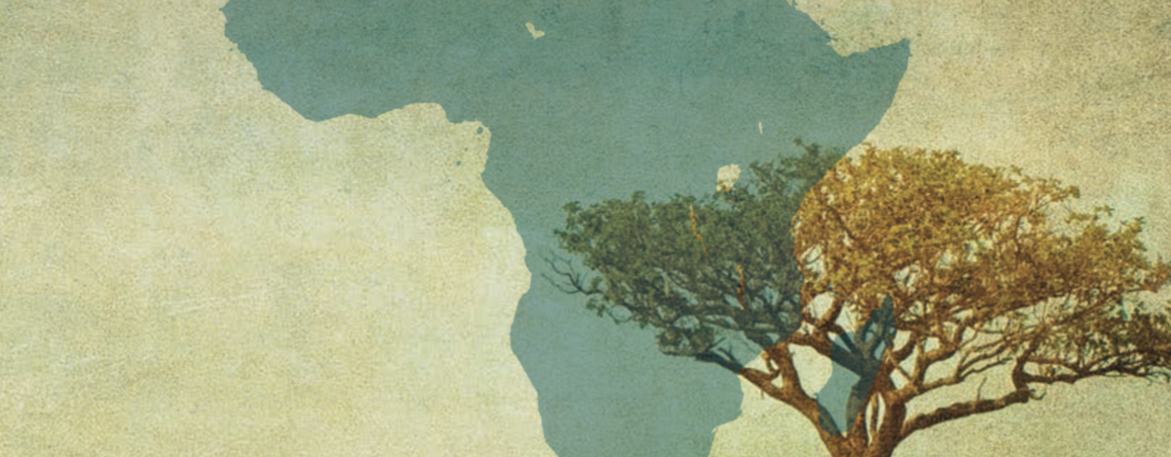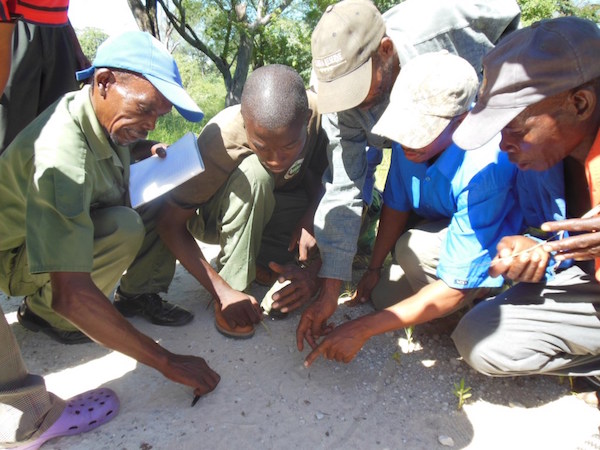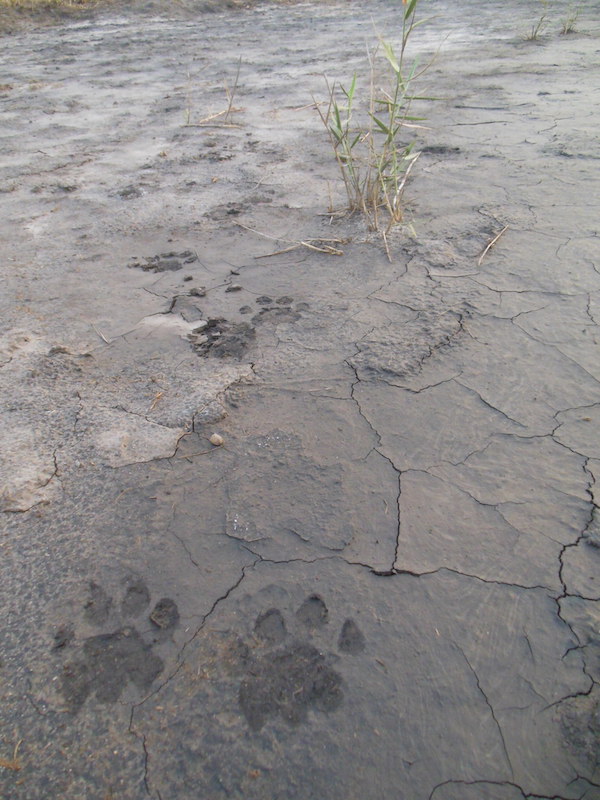
The following case study is an extract from Protecting Community Lands and Resources in Africa, a book of case studies that highlights land rights advocates’ innovative community land protection efforts.
By Fidi Alpers, IRDNC
Integrated Rural Development and Nature Conservation (IRDNC) works to support the Khwe San community in Bwabwata National Park (BNP), Namibia to protect their access to and benefits from the natural resources on their ancestral lands. Bwabwata was only recently transformed into a national park in 2007; as a result, there are high-level political and economic incentives that prevent the Khwe community from accessing their customary ownership rights to the lands themselves. Therefore, instead of asserting land rights as a strategy, the focus has been on empowering the community through a government-driven, community-based natural resource management programme (CBNRM).
IRDNC uses a multilevel methodology to facilitate this process:
IRDNC is based on the ground and has been working with the same communities for many years, which has been key to building trust with both governmental and traditional authorities. When engaging with traditional authorities and communities, it is important that IRDNC’s work is not imposed externally. Gaining legitimacy for IRDNC’s projects while promoting respect for traditional authorities is essential, and this is achieved both by tapping into existing knowledge systems and drawing traditional authorities and elders into every project. Honoring the support of traditional authorities demonstrates to the community that their elders are valued and respected rather than irrelevant, which strengthens the traditional leadership structure and cultural core of the community.
The approximately 5,500 Khwe San residents of the Bwabwata National Park in Namibia have a rich cultural knowledge that has enabled them to subsist in the region’s dry deciduous woodlands for centuries via hunting and gathering. In fact, an estimated 75% of their nutritional requirements are still secured from gathering wild resources. Traditionally, women were responsible for collecting wild foods and supplies such as reeds, grasses and wood, while the men hunted. Khwe elders can still recall chasing large wildlife species to the point of collapse from exhaustion, then returning home laden with kudu, eland or sable antelope meat for their families. However, in 1963 the area was proclaimed the West Caprivi Nature Park and several years later hunting was banned. This policy had a tremendously negative effect on the Khwe San community, as they simultaneously lost both the capacity to subsist independently on their ancestral homelands as well as a core element of their cultural identity.
For most indigenous peoples, traditional knowledge is a critical factor in the community’s collective welfare and survival. Khwe San indigenous knowledge systems are based upon a traditional hunting and gathering lifestyle and ethos, and include expert knowledge about biodiversity and natural resource management. Various academics report that San trackers and hunters demonstrate a complex skill set, including an advanced ability to observe, qualify, and assemble facts about human and animal behaviour and the natural environment in a manner that surpasses the capacity of many professionals in western society.
However, most Khwe youth see indigenous knowledge as belonging to the previous generation and as having limited practical application in the modern world. The formal education system plays a central role in furthering this trend. First, because the Khwe San reside in remote locations, their children often must attend boarding schools in urban centers far from home. Separated for long periods of time from their families and the ways in which traditional knowledge is communicated, Khwe children are taught foreign systems of knowledge in a language other than their own. There is a gaping disjuncture between Khwe knowledge systems, teaching styles, and supporting social values and those associated with mainstream Namibian society and the formal education system. The end result is that San children feel alienated in Namibian schools and drop out prematurely, with their sense of self-confidence diminished and without the qualifications they need to get jobs in the formal sector. They often return to their rural settlements with a negative outlook on their own culture and value system.
A Tekoa guide from the Khwe San community leads a trek through Bwabwata National Park. © IRDNC
From 2005-2009, IRDNC had a formal mandate within Bwabwata National Park to help residents to establish a representative legal association and an integrated national park management program between the resident community and the Namibian Ministry of Environment & Tourism (MET). However, successful implementation of this shared governance institution has been a serious challenge. In the absence of a functioning co-management relationship, IRDNC has supported the Khwe community to lobby for, and receive, access and benefits on the land. The organisation and the community are strategically focusing on these rights as a first step, as there are high-level and political incentives and historical land issues that prevent the Khwe community from accessing their land rights.
Within Bwabwata National Park, poverty has fuelled some overharvesting of natural resources. To address this, IRDNC worked with and counselled traditional authorities (and thereby their communities) on this overuse. The community subsequently chose resource monitors to monitor sustainable use. Parallel to these community discussions, IRDNC also met with key government officials about the Khwe community in Bwabwata, discussing the need for community benefit-sharing as a method of sustainable conservation of the National Park. It became important for the community to prove and justify to the government that wildlife and natural resources such as high value plants were being protected. The community’s monitoring system became one way to provide evidence to the government that resources were well-kept and that monitoring of the use of these resources was actually taking place. The government, over time, came to recognize local efforts and has supported periodic game counts to provide further evidence of the positive impact of the Khwe community’s sustainable natural resources management.
Community-driven documentation and monitoring of natural resources has been enhanced by using tools and methods to visually indicate on maps key features of natural resource use, such as access points and natural resource locations. Participatory resource mapping and zoning helps to generates discussion within and between communities. IRDNC has assisted communities to produce digital maps and share these with government. In the coming years, IRDNC and the community will present scientific maps on plant species and other resources and organize a harvesting trip with government to encourage government recognition of access to other resources.
IRDNC has also supported Khwe communities to negotiate for more equitable, empowered community-investor partnerships through liaising with government officials regarding the allocation of high value tourist concessions within Bwabwata National Park. Kyaramacan, a Khwe community-based organization within Bwabwata, has been awarded a high value tourist concession within the park that they wish to develop into a lodge IRDNC is assisting Kyaramacan in ongoing negotiations between the government, investors and the community and in managing its contracts. This has included negotiation of three concession contracts between the government and Kyaramacan.
Overall, IRDNC has been successful in supporting communities to assert and use resource rights within the National Park. Five years ago, there was no legislation or policy allowing communities to benefit from natural resources within the park. With pressure on governments for communities to benefit from wildlife (through hunting, tourism etc.), and lobbying for legislative change, the Khwe have piloted a system for community-based use and management of these natural resources. Community monitoring has created the data to prove that community resource use was not causing harm, which supported a legislative change and contract with the government to allocate hunting concessions within the park. This has led to an increase in the number of wildlife that can be sustainably hunted by community members, resulting in more meat and benefits for the community. There has been a direct correlation between better protection of wildlife (through monitoring and management) and better benefits for the community.
During interactions with community members out in the bush, it became clear to IRDNC staff that the real talents, passions and interests of the Khwe involved “walking and talking,” wherein elders lead community youth on walking trips into the wilderness while orally sharing, coaching and training them on Khwe cultural knowledge and values. Listening to the elders’ lessons during these trips revealed their heart-felt concern that as older members of the community passed away, rich cultural knowledge was being lost forever. After discussions with the community, IRDNC supported Khwe elder Sonner Gerea to attend workshops and seek financial assistance to develop a community-led tracker training project in which elders could teach traditional knowledge to local youth in their own time, language, curriculum and setting. Tracking was chosen as the preliminary focus because it is one of the skills that is rapidly disappearing amongst Khwe community members due to lack of use, and also one that youth can leverage for financial gain.
After the proposal was accepted and initial funding granted, the next step was to identify elders in the community who still had wildlife tracking knowledge despite the forty-year ban on hunting in the area. Sonner Gerea and the IRDNC team ventured into the Khwe San villages within Bwabwata National Park, and found many people who talked about hunting and remembered particular events, but only five individuals who still possessed deep traditional tracking knowledge. IRDNC recruited these elders as traditional knowledge teachers, then asked village headmen to put forward the names of eligible young community members who might be interested in attending the tracker-training sessions.

Tekoa guides in training learn how to track wildlife in Bwabwata National Park. © IRDNC
In 2008, the Khwe officially launched their Traditional Environmental Knowledge & Outreach Academy (TEKOA) tracker-training programme in Bwabwata National Park. Through the TEKOA program, Khwe elders train their school-going (and school-leaving) youth in various aspects of their rich heritage, including tracking, ethno-botany, traditional leadership, conflict management strategies, history, and Khwe San language skills. The programme supports community elders and youth to spend time together which in turn builds relationships, restores dignity, and hones youth’s skills in ecological management applied science, including wildlife tracking and sign interpretation skills in the bush. An intermittent programme at first, the mobile tracker training team now operates for approximately 4 days per month, creating a regular space for community members to learn from one another and breathe new life into their traditional skills.
In Bwabwata National Park there are few opportunities for formal employment. Locally available economic opportunities are largely informal, and many of these are exploitative and under-paid. The Traditional Environmental Knowledge Outreach Academy (TEKOA) Tracker Training Programme aims to turn this situation around. By exposing the youth to their natural heritage of traditional Khwe knowledge, the program both hopes to increase their confidence and sense of self-worth, and to equip them to become the future holders of knowledge in a community that is rapidly transitioning from its hunter-gatherer existence. The curriculum also aims to provide life skills and coping strategies for the modern world, and, perhaps most importantly, to support youth to develop vision and hope for their futures.
Successes of the TEKOA tracker-training programme include:

Lion tracks in Bwabwata National Park. © IRDNC
Strategies for Success
The process followed to get the TEKOA raining programme up and running was critical to its success. The following are reflections on the key “process elements” that contributed to TEKOA’s success:
TEKOA is planning to support the community to realize their larger cultural restoration dreams, and is currently involved in early-stage communications with the Namibian Government regarding the establishment of a permanent training academy in the Park. It is envisaged that, following initial start-up donor funding, this academy could run as a financially sustainable entity through which fees from external participants would sponsor the learning of Khwe youth – creating a secure future for knowledge sharing. This project will also provide a model and inspiration for other San communities in Namibia who are in a position to build upon traditional skills.